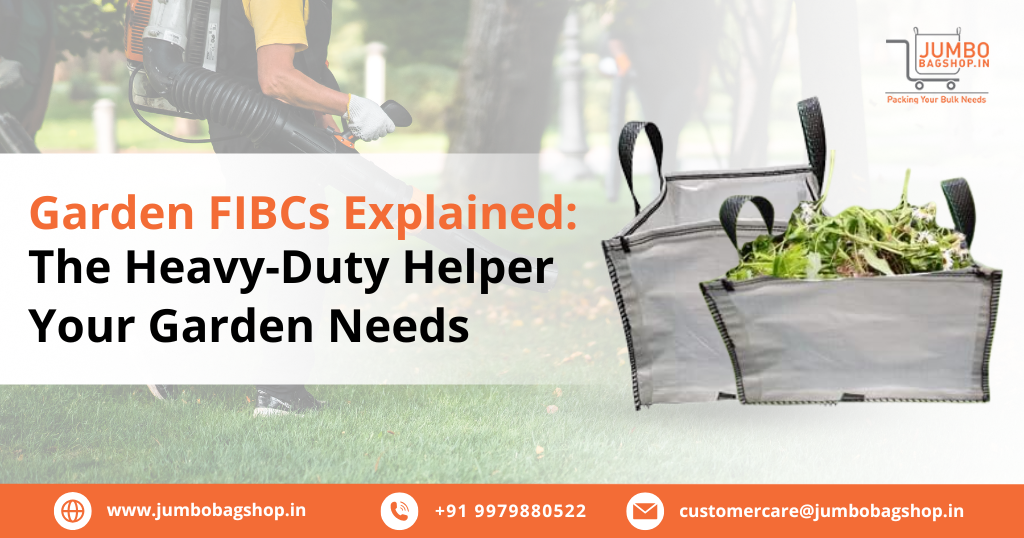Garden FIBCs Explained: The Heavy-Duty Helper Your Garden Needs

Gardening is both a passion and a responsibility. Whether you’re an avid home gardener or managing a large-scale landscape project, having the right tools can make all the difference. Among the essential yet often overlooked items in modern gardening is the Garden FIBC – a Flexible Intermediate Bulk Container also known as a garden bulk bag, builder’s bag, or jumbo bag. These heavy-duty bags are revolutionizing garden logistics with their strength, durability, and versatility.
In this comprehensive guide, we’ll dive into what Garden FIBCs are, their benefits, types, uses, and why they should be part of your gardening essentials.
What is a Garden FIBC?
A Garden FIBC is a large, woven polypropylene bag designed to store and transport bulk garden materials. Capable of handling weights ranging from 500 kg to over 2000 kg, these heavy-duty garden bags are the go-to solution for managing garden waste, soil, compost, gravel, mulch, and other bulk materials.
The term FIBC stands for Flexible Intermediate Bulk Container, and in gardening, this flexibility becomes a superpower. Unlike rigid containers, FIBCs are designed to adapt to the volume and weight of their contents, making them easy to store and handle.
Key Benefits of Using Garden FIBCs
1. Unmatched Durability
Made from high-tensile woven polypropylene fabric, Garden FIBCs are designed to withstand extreme conditions. Whether you’re working in a wet climate or dragging the bag over rough terrain, these bags don’t tear easily.
2. Cost-Effective Storage Solution
Instead of investing in large bins or wheelbarrows, a single FIBC can carry up to a ton of material. This reduces the number of trips required for disposal or transportation, saving time and labor.
3. Multi-Purpose Use
From composting and storing potting soil to collecting green waste and transporting firewood, multi-use jumbo garden bags simplify every task in your garden.
4. Eco-Friendly Option
Many garden bulk bags are made from recyclable materials and are themselves reusable. This makes them a sustainable choice for eco-conscious gardeners.
5. Ease of Handling
Most FIBCs come with sturdy lifting loops, allowing them to be easily lifted by forklifts, cranes, or even with simple manual handling if needed. This is particularly useful when dealing with heavy loads like gravel or logs.
Common Applications in Gardening
Garden FIBCs shine when it comes to versatility. Here are some of the most popular uses:
-
Compost Storage: Large-capacity FIBCs are ideal for holding compost until it’s ready to be spread.
-
Soil Transportation: Moving large volumes of topsoil or potting mix becomes effortless.
-
Waste Collection: Trimmed branches, leaves, and other green waste can be quickly collected.
-
Mulch and Bark Storage: Keep materials dry and tidy for future use.
-
Harvesting Produce: For large-scale vegetable gardens or orchards, FIBCs simplify harvesting logistics.
Types of Garden FIBCs
Understanding the types of FIBCs can help you choose the right one for your needs:
1. Standard Garden Bulk Bags
These are the most common and affordable. They are perfect for general garden use and can handle light to moderate weights.
2. Ventilated FIBCs
Ideal for storing organic materials like compost or wood, these bags allow air to circulate, preventing moisture buildup and rot.
3. Baffle Bags
Baffle-style jumbo bags maintain a square shape even when filled, saving space and improving stacking stability.
4. U-Panel and Circular Bags
These are more flexible and easier to store, making them a great choice for seasonal gardeners or those with limited space.
Tips for Choosing the Right Garden FIBC
When selecting the best garden FIBC bag for your needs, consider the following factors:
-
Weight Capacity: Make sure the bag can handle the material’s weight. Typical FIBCs range from 500 kg to 2000 kg capacity.
-
UV Protection: If your bags will be stored outside, opt for UV-treated bags to prevent sun damage.
-
Coating and Liners: For fine materials like sand or soil, choose FIBCs with inner liners to prevent leakage.
-
Size and Shape: Consider your storage space and material volume when selecting bag dimensions.
-
Reusability: Some bags are single-use, while others are designed for multiple uses.
How to Use and Store Garden FIBCs
Loading
Always ensure the bag is on stable ground and open fully before loading. Distribute the weight evenly to maintain stability during lifting.
Lifting
Use the lifting loops provided. If using machinery, ensure compatibility with lifting equipment. Never lift a bag from a single loop unless it’s specifically designed for it.
Storing
Empty and fold the bag when not in use. Store in a dry, shaded area to extend its lifespan, especially if it’s not UV-treated.
Why Gardeners Love FIBCs
The adoption of jumbo garden bags is growing rapidly among both commercial landscapers and home gardeners. The reason? These bags take the hard work out of heavy lifting, hauling, and storing, freeing up time for actual gardening. They also help in maintaining a tidy workspace, minimizing clutter, and promoting a safer garden environment.
In professional landscaping, Garden FIBCs are an integral part of operations, allowing for efficient bulk material management and cost savings. For home gardeners, the same convenience is now just a click away.
Conclusion
Garden FIBCs are the unsung heroes of modern gardening. With their rugged durability, exceptional capacity, and wide range of applications, they offer unmatched convenience and efficiency. Whether you’re hauling soil, composting organic waste, or organizing your landscape materials, FIBCs are a smart investment that can handle it all.
As gardening evolves, so do the tools that support it. Garden FIBCs are not just bags—they’re indispensable partners in cultivating a more productive, organized, and sustainable garden.
Ready to Upgrade Your Garden Game?
Discover premium-quality garden bulk bags, jumbo garden bags, and heavy-duty FIBCs at unbeatable prices—only at JumboBagShop. Shop now and give your garden the heavy-duty helper it deserves!
